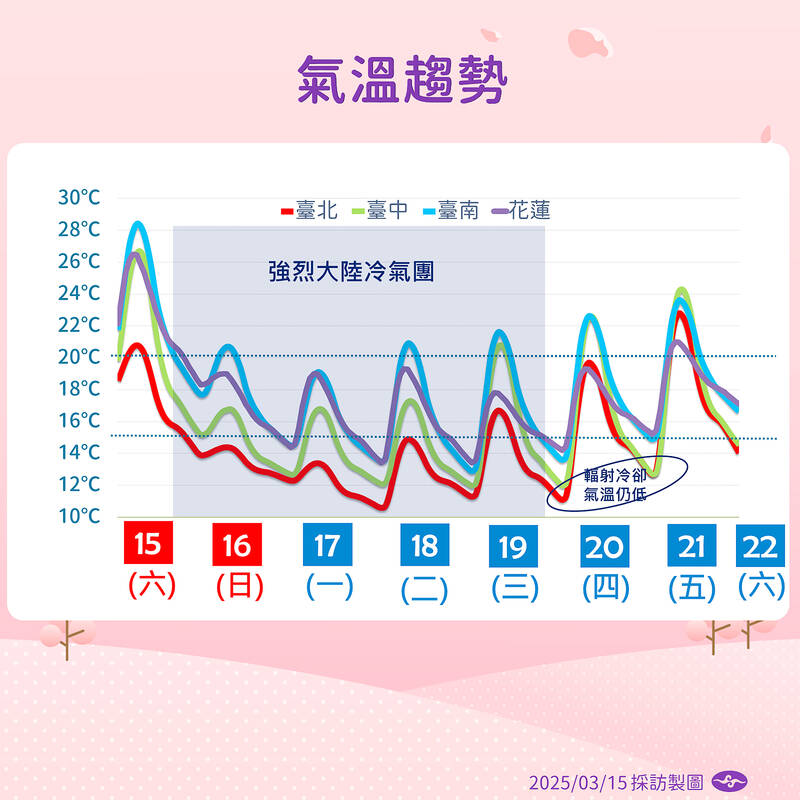A strong cold air mass could push temperatures in parts of northern Taiwan down to single digits this week, the Central Weather Administration (CWA) said.
Daytime temperatures yesterday ranged from 22°C to 26°C in northern and northeastern Taiwan, and fell to 15°C to 16°C at night, while highs in central and southern Taiwan hit 28°C to 31°C before falling to 18°C to 22°C at night, the CWA said yesterday.
However, due to the effects of the continental cold air mass, temperatures are forecast to dip to 10°C to 18°C in northern and northeastern Taiwan, 12°C to 20°C in central Taiwan, 14°C to 24°C in the south, and 14°C, to 23°C in the east today and tomorrow, it said.

Photo provide by the Central Weather Administration
Temperatures are expected to fall further from Tuesday to Thursday due to the cold air mass coupled with a radiative cooling effect, the CWA said, referring to the cooling of the ground under clear skies, light winds and dry conditions.
The mercury is expected to dip to 9°C in the north, 11°C in central Taiwan, and 13°C in the south, and dry weather is expected during the cold spell, it said.
Meanwhile, the leading edge of the cold air mass reached northern Taiwan yesterday morning, bringing intermittent rain and thunderstorms across the nation, while there were also regional showers in the north, it said.
A heavy rain advisory was issued yesterday for Keelung, Taipei, New Taipei City, Taoyuan and Hsinchu City, as well as Hsinchu and Miaoli counties, indicating 24-hour accumulated rainfall would exceed 80mm or hourly rainfall would exceed 40mm.
There were also showers in mountainous areas in the east and parts of central and southern Taiwan. The weather is expected to turn dry and colder today, it said.
The cold air mass is expected to weaken on Friday, when temperatures would begin to rise again, it said.

Intelligence agents have recorded 510,000 instances of “controversial information” being spread online by the Chinese Communist Party (CCP) so far this year, the National Security Bureau (NSB) said in a report yesterday, as it warned of artificial intelligence (AI) being employed to generate destabilizing misinformation. The bureau submitted a written report to the Legislative Yuan in preparation for National Security Bureau Director-General Tsai Ming-yen’s (蔡明彥) appearance before the Foreign Affairs and National Defense Committee today. The CCP has been using cognitive warfare to divide Taiwanese society by commenting on controversial issues such as Taiwan Semiconductor Manufacturing Co’s (TSMC, 台積電) investments in the

INVESTIGATION: The case is the latest instance of a DPP figure being implicated in an espionage network accused of allegedly leaking information to Chinese intelligence Democratic Progressive Party (DPP) member Ho Jen-chieh (何仁傑) was detained and held incommunicado yesterday on suspicion of spying for China during his tenure as assistant to then-minister of foreign affairs Joseph Wu (吳釗燮). The Taipei District Prosecutors’ Office said Ho was implicated during its investigation into alleged spying activities by former Presidential Office consultant Wu Shang-yu (吳尚雨). Prosecutors said there is reason to believe Ho breached the National Security Act (國家安全法) by leaking classified Ministry of Foreign Affairs information to Chinese intelligence. Following interrogation, prosecutors petitioned the Taipei District Court to detain Ho, citing concerns over potential collusion or tampering of evidence. The

‘COMPREHENSIVE PLAN’: Lin Chia-lung said that the government was ready to talk about a variety of issues, including investment in and purchases from the US The National Stabilization Fund (NSF) yesterday announced that it would step in to staunch stock market losses for the ninth time in the nation’s history. An NSF board meeting, originally scheduled for Monday next week, was moved to yesterday after stocks plummeted in the wake of US President Donald Trump’s announcement of 32 percent tariffs on Taiwan on Wednesday last week. Board members voted to support the stock market with the NT$500 billion (US$15.15 billion) fund, with injections of funds to begin as soon as today. The NSF in 2000 injected NT$120 billion to stabilize stocks, the most ever. The lowest amount it

NEGOTIATIONS: Taiwan has good relations with Washington and the outlook for the negotiations looks promising, Minister of Economic Affairs J.W. Kuo said Taiwan’s GDP growth this year is expected to decrease by 0.43 to 1.61 percentage points due to the effects of US tariffs, National Development Council (NDC) Minister Paul Liu (劉鏡清) said at a meeting of the legislature’s Economics Committee in Taipei yesterday, citing a preliminary estimate by a private research institution. Taiwan’s economy would be significantly affected by the 32 percent “reciprocal” tariffs slapped by the US, which took effect yesterday, Liu said, adding that GDP growth could fall below 3 percent and potentially even dip below 2 percent to 1.53 percent this year. The council has commissioned another institution